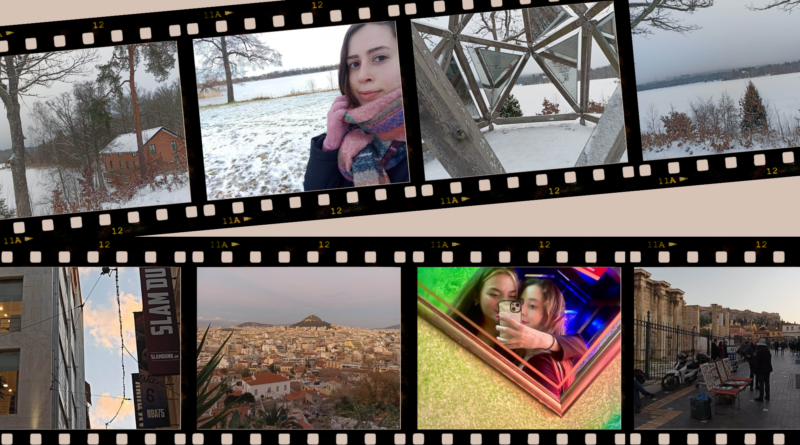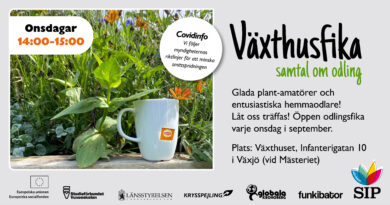Greece vs Sweden 2.0
Six months ago, I had barely spent a week in Sweden and I was writing about how it compares to Greece at first glance. Little did I know, I knew nothing. I mean, sure, a lot of differences were easy to spot immediately: the weird weather (I have an app), the beautiful people (I have eyes) and the biggest cultural differences. But still, I hadn’t yet had a proper fika break, swam in a lake or been dancing with very drunk Swedes, so my Swedish experience was quite limited.
Now, I recently spent some time back in my country, Greece, and both whilst being there and upon returning here I had a lot of opinions to share, whether my friends wanted to hear them or not. So, what better time to write a blog post instead?
In my experience, talking about the weather is the safest route to take when trying to make conversation, because at the end of the day everybody loves to talk about the weather. And it’s true, it has been one of the most obvious differences between the two countries I’ve lived in: I barely ever saw snow in Athens, and for most of December my weather app was indicating clear 20 degrees days whilst I was here layering socks to go to the grocery store. But surprisingly, I didn’t hate it. It’s quite astonishing how easily one can get accustomed to such conditions, because the change is mostly so gradual that winter sneaks up on you and one day you find yourself submerged in snow knee deep questioning the life decisions that lead you there. Not that that happened to me, obviously. Overall, it was nice actually experiencing winter for once. I had a white Christmas that so far only existed in movies for me, I gave my warm clothes a chance to actually be used and worn outside and at some point I had to completely stop caring about how ridiculous I looked in something as long as it kept me warm, which one could argue was personal growth. The scenery was beautiful and since people were eager to shovel their entrances and the roads were always full of salt, it didn’t make places particularly harder to navigate. When it snows in Athens, half of the city is usually out of power and/or water but that’s a topic for a different day.
Nevertheless, it was quite fun in Greece in that regard too. I went back in the end of January/beginning of February, which was as cold as it gets, so let’s say around 15 degrees. There, as it is the case with most of the Mediterranean, we have the exact opposite situation: it’s warm and nice outside but very cold inside buildings. I usually say that as a joke but there is some truth behind it, in Greece you must wear your coat to enter your house instead. Whilst outside though, it was beautiful. The sun was shining and generally existing in the background for more than a couple of hours a day, there was green grass and unfrozen water and… people on the streets. A sight I found quite amusing, since they were covered in thick coats and scarves (reminder: min 15 degrees!!) whilst I was strolling around in one layer of clothing. They were also questioning my choices in response, which is only fair, but how could I explain that I had to adjust to Viking conditions?
Speaking of people, one of the genuinely most interesting aspects of Sweden to explore so far has been… exactly that, the people. I remember that on my previous post I was writing about how Swedes have a sometimes too harsh of a reputation for being “anti-social” or unfriendly even, but they just socialise in a different, non-aggressive way and I still stand by that. I just feel like I am way more equipped to elaborate on that now.
Swedes are friendly people, and they are easy to approach both personally and professionally. On an impersonal level, I have never had a stranger be rude to me or refuse to help me with something, they are always polite and resourceful. I mean even the fact that they always great you with “hej hej” instead of just “hej” is just cute. I may be telling on myself here, but at first I thought that people at work would do that to make us feel more comfortable but apparently no, it’s just them being Swedish and therefore, cute.
But of course, when evaluating how approachable people are, we mostly mean on a personal level and I have to say that they are pretty open to that too. I admit that most of my closest people here are not really Swedish, which is mainly due to the international community this project aims to build and ESC in general, but I am happy to say that I have a fair number of Swedes I am friends or friendly with.
I have come to the conclusion that Swedes in general like talking to people way more than people give them credit for and they are not hard to make conversation with. They avoid confrontation as much as they use garlic sauce in their food, they appreciate a good sense of humour and they don’t need much convincing to have a fika or dinner with you. The only difference in all that is that they are never going to make the first move to get to know someone, they are open to being approached but they are not the ones doing the approaching and that’s what people may misinterpret as “unfriendliness”.
Now, if you ever find yourselves trying to strike a conversation with a Swede, here are my hot topic suggestions with guaranteed results: talk about sports. Swedes love sports and they have all signed up to something. Sometimes its something weird, ask them about it, they’ll love to elaborate. Talk about the weather, that’s a safe one, I told you, but it works. Most importantly, talk about the Danes, they love hating the Danes. It doesn’t matter if you have anything else to contribute to the conversation, as long as you establish that the tall blond people on the eastern side of the Öresund bridge are not the same (hint: are better) than the other tall blond people on the other side of the bridge, you will have won them over. But joking aside, Swedes really enjoying hearing about how foreigners perceive them and even about the stereotypes they may have about them abroad. I think that a lot of people would be much more eager to fight in this scenario, but Swedes usually just find them amusing or…true. I think I may have explained the word “kryokolos”* a bit too many times, but they still find it funny so who am I to deny them the self-deprecating joy?
Meeting my friends in Greece again was also very interesting and quite refreshing. Compared to my group of friends here, we were being way more spontaneous; we’d make and change plans in a heartbeat without having to check if we had booked to do…laundry first, and there was a “go with the flow” vibe I cannot really put into words. The first time I saw my best friend we had planned to have a “chill drink” at a local bar on a Wednesday evening, and we ended up dancing and having shots until 6 the next morning, life happens. In Sweden, we wouldn’t even have a place to go do that on a weekday, let alone have random guests buying us alcohol (even more so for 2 euros). If we’re being honest, we wouldn’t have a place for that during the weekend either and I am not really talking about the prices.
Now, I am not necessarily saying that that’s a good or bad thing, it’s just a cultural difference, but I did very much enjoy having more options again. In many ways it’s very helpful to abide by Sweden’s structure: you have a schedule; you know what to expect in advance and you can be prepared for most things. In Sweden, when you say “let’s go for a coffee sometime”, you actually make that happen and you don’t just say that to end a conversation with some acquaintance you randomly met at the supermarket. Sweden has me waking up at 6:30 every morning just for the sake of lazy mornings and self-care routines and I don’t think I will ever willingly give that up. But there is something very appealing in Greece’s long nights, adventurousness and carefreeness that comes with them. You go out, you meet people you know, or people that know people you know, and you can very easily end up doing something you never thought you would be when you stepped foot out of your house that evening. You walk around and there are people singing, dancing, talking a little bit too loud or too much but you can feel that the city is full of life.
I am sure I am going to miss that feeling more when the summer finally arrives, but at least then I will have Athens’ 40 degrees torturous weather to bring me to my senses. See, it’s the weather again. Or maybe I won’t miss it at all because who knows how Växjö is going to be then? People swear that it’s a different city during the summer and I can already see that, when there’s a good day outside people are attracted to the streets like magnets, they have barbeques, picnics, the lakes are about to have their first swimmers.
I am planning on coming back and reflecting on this when I am getting closer to the end of my ESC year in Sweden, and I will thus have a full picture of everything happening in both countries I now call home. Until then, vi ses, Maria.
*kryokolos: kryo(cold)+colos(butt). Literally translates to “coldbutt”, used to describe someone uptight, cold in behaviour, not receptive to humour. Often used to describe northern people, drawing the parallelism between the cold weather and their attitude.




